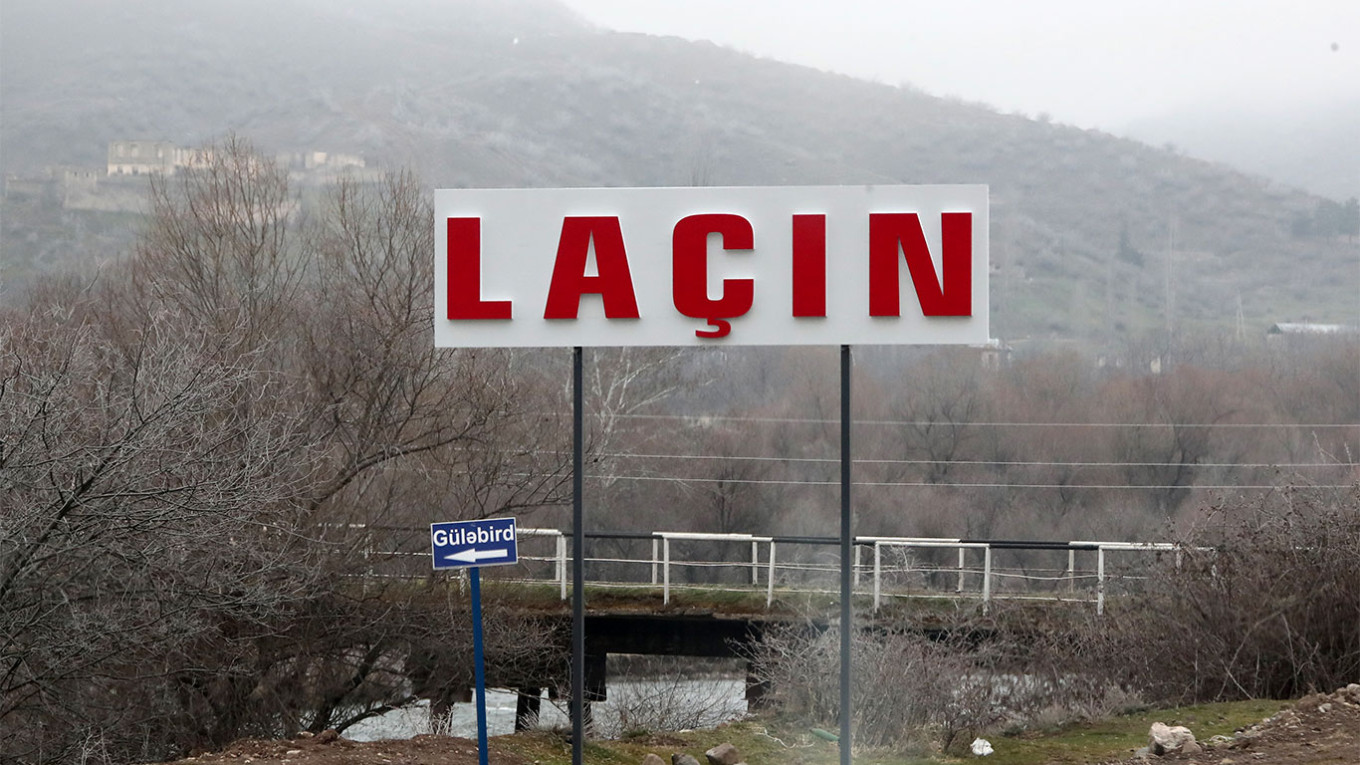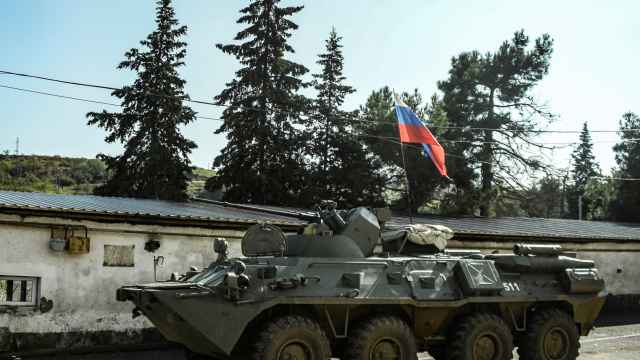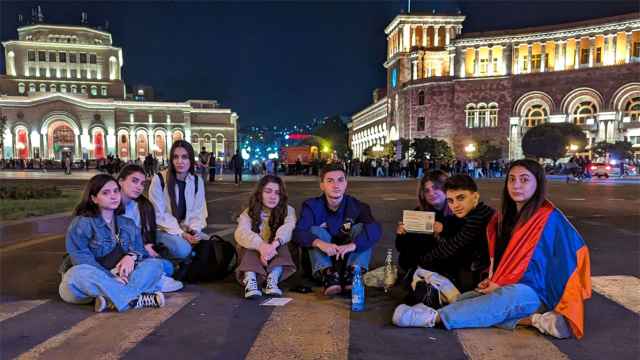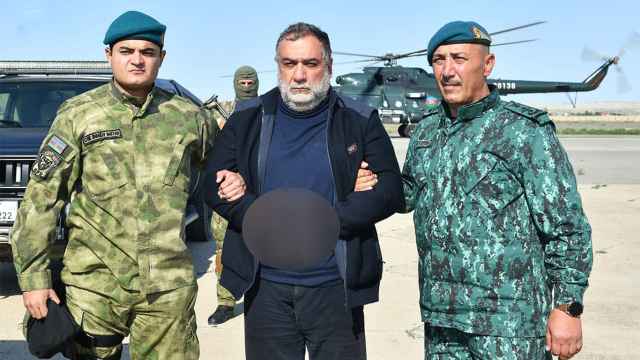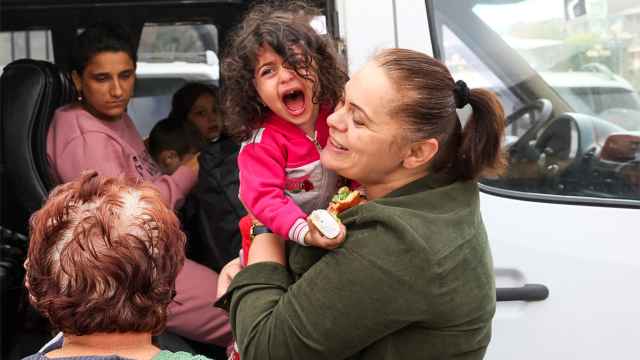The blockade of the Lachin corridor, the only road connecting the disputed region of Nagorno-Karabakh with Armenia, has sparked concern of a humanitarian disaster in the region, not to mention a fresh outbreak of hostilities between Armenia and Azerbaijan.
The crisis has also renewed scrutiny of Russia’s 2,000 peacekeeping troops in the region, who despite being tasked with ensuring the vital road remained open, failed to prevent the stand-off and have been unable to find a quick resolution to it.
What follows is an overview of the latest escalation in the Nagorno-Karabakh conflict and Russia’s role in it.
What Happened?
A group of Azerbaijani protesters who identified themselves as environmental activists set up a protest camp on a stretch of the Lachin corridor near the city of Shusha (known as Shushi in Armenian) early on Monday morning, according to an official statement published by the Armenian foreign ministry.
The activists are reportedly protesting illegal mining they say is taking place in Armenian-controlled parts of Nagorno-Karabakh and the resulting transfer of extracted minerals to Armenia.
There has been speculation on the Armenian side that the demonstrators could have links to the Baku government and may be acting as agents provocateurs.
Armenian Prime Minister Nikol Pashinyan said on Thursday that the roadblock had left thousands of Nagorno-Karabakh residents stranded and unable to return home amid plummeting winter temperatures, hampered delivery of essential goods, and prevented critically ill patients from receiving urgently-needed treatment.
The “humanitarian crisis” has been further worsened by Azerbaijan’s decision to cut the disputed territory’s gas supply, according to Pashinyan.
What is Armenia saying?
The Armenian foreign ministry labeled the apparent environmental protest a deliberately provocative act orchestrated by Azerbaijan in violation of the trilateral peace agreement concluded between the two countries and Russia at the end of the Second Karabakh War in 2020.
“As a result of this operation, the residents of Nagorno-Karabakh have been deprived of the right to free movement, Nagorno-Karabakh is facing the imminent threat of a food and humanitarian crisis,” the ministry said in a statement released on Tuesday.
The Armenian parliament on Wednesday passed a resolution condemning Azerbaijan’s actions and calling on Russia to take the “necessary measures” to restore free movement through the corridor.
But some members of Armenia’s ruling Civil Contract party went as far as openly criticizing Russia’s peacekeeping efforts.
Deputy Vigen Khachatrian said Russia’s actions suggested it was looking to “draw Armenia into a war with Azerbaijan.”
“In my view, Russia is trying to abandon Karabakh and get Armenia from Azerbaijan in return,” Radio Free Europe/Radio Liberty quoted Khachatrian as saying on Wednesday.
What is Azerbaijan saying?
Azerbaijani officials have rejected claims that the actions of protesters in the Lachin corridor could lead to a humanitarian crisis and attempted to point the finger of blame at Russia instead.
“The Lachin road is blocked not by Azerbaijani protesters, but by the Russian peacekeeping contingent,” Hikmet Hajiyev, foreign policy advisor to Azerbaijan’s President Ilham Aliyev, said in an official statement on Tuesday.
“Representatives of civil society in Azerbaijan are trying to stop the illegal transportation of looted natural resources, but aren’t interfering with the movement of other civilian vehicles,” Hajiyev added.
The official position was echoed by one of the protesters interviewed by regional news outlet Caucasian Knot, who said that the group was seeking a meeting with the head of Russia's peacekeeping forces, Andrei Volkov. However, instead of meeting with the protesters, the Russians decided to “close the road with barricades and two armored personnel carriers.”
Both Azerbaijani officials and the protesters have denied that they are linked in any way.
What was Russia’s response?
Russia did not acknowledge the escalation until Tuesday when it released the latest Defense Ministry brief noting that its peacekeeping forces were “engaged in negotiations with representatives of Azerbaijan to resume free movement of civilian car traffic” through the Lachin corridor.
Russian Foreign Ministry spokesperson Maria Zakharova on Thursday deemed “unfounded accusations and provocative actions” directed at Russia’s peacekeeping forces in Nagorno-Karabakh “unacceptable and counterproductive.”
“The Russian peacekeeping contingent is fulfilling its tasks effectively, acting as a guarantor of stability in the region,” Zakharova said during a Foreign Ministry briefing, adding that Russian forces had “been actively working to de-escalate the situation.”
“We are counting on the restoration of full-fledged transport links in the very near future," Zakharova said.
What does this mean for Russia’s Nagorno-Karabakh mission?
Despite the mounting accusations against Russia’s peacekeeping mission, most analysts agree that the current crisis is more likely to backfire on Azerbaijan rather than significantly undermine Russia’s role in the region.
“The mission finds itself in a difficult situation, because, with the current crisis in Ukraine, it is not easy for those in the West to support the Russian presence in Nagorno-Karabakh,” International Crisis Group analyst Olesya Vartanyan told Eurasianet.
“The key here is that without the peacekeepers it could be even worse. They are still in a way helping to sustain this shaky stability on the ground,” she added.
A Message from The Moscow Times:
Dear readers,
We are facing unprecedented challenges. Russia's Prosecutor General's Office has designated The Moscow Times as an "undesirable" organization, criminalizing our work and putting our staff at risk of prosecution. This follows our earlier unjust labeling as a "foreign agent."
These actions are direct attempts to silence independent journalism in Russia. The authorities claim our work "discredits the decisions of the Russian leadership." We see things differently: we strive to provide accurate, unbiased reporting on Russia.
We, the journalists of The Moscow Times, refuse to be silenced. But to continue our work, we need your help.
Your support, no matter how small, makes a world of difference. If you can, please support us monthly starting from just $2. It's quick to set up, and every contribution makes a significant impact.
By supporting The Moscow Times, you're defending open, independent journalism in the face of repression. Thank you for standing with us.
Remind me later.


